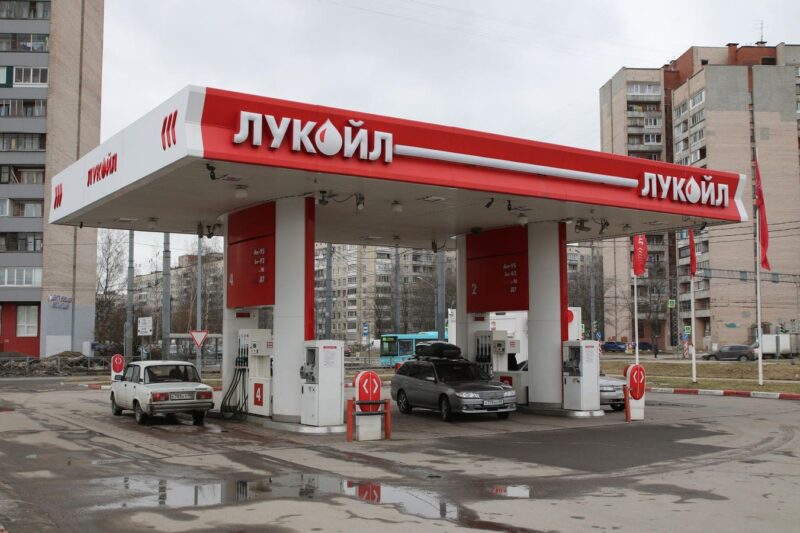More Russian gas stations are rationing sales, or closing altogether
SOPA Images/LightRocket via Getty Images
Two weeks ago we noted that Russia was facing gasoline shortages dues to repeated drone strikes on Russian refineries. The problems, at first limited to outlying regions and occupied Crime, have worsened fast and spread across much of the country , with rising prices, long queues, rationing, and in in some cases, pumps running dry.
And the Russian people, who have so far tolerated Putin’s ‘special military operation’ as a distant conflict which had nothing to do with them, are now beginning to feel the effects – and place blame.
“Gas Stations Run Out Of Gasoline Faster Than New Batches Are Delivered “
The price at the pump is now up to the equivalent of $4.52 a gallon in some places, compared to the official average price of $2.66 a gallon quoted earlier in September.
But it is not just the price; increasingly Russians are having trouble finding gas. In many regions sales are limited to 5 gallons per customer. One regional chain is now reportedly only selling to commercial customers with fleet fuel cards, while another flipped the idea and is no longer selling to customers with fuel cards. And stations have banned customers filling fuel cans.
Many stations in the Russian-occupied Crimea are now closed, and those that are still open only have diesel. In the Russian region of Nizhny Novgorod, school buses (which run on gasoline) have been unable to pick up kids because of the fuel shortage, while regional authorities denied there were any disruptions.
Many versions of Ukrainian ‘oil refinery bingo’ are being circulated showing how many refineries have now been struck
Twitter/X
“We see and understand your concerns about queues at gas stations and difficulties with refueling…There is no physical shortage of fuel in the Vanino district, and queues at gas stations are caused by repair work at refineries and rush demand,” Alexey Maslov, head of the Vanino district, told Russian media. “In the coming days, new batches of gasoline will arrive, which will meet the needs of the population until October 12.”
According to Maslov, the problem is caused by “ten-day routine maintenance at refineries.“ However, the promised new delivery he describes only amounts to 180 tons which will only meet a fraction of the demand. Maslow wants to discourage people from buying.
“The purchase of fuel by motorists ‘for future use’,” says Maslow, “This has created an artificial shortage, when some gas stations run out of gasoline faster than new batches are delivered, and kilometers of queues form at others.”
The solution is clear.
“The most important thing we can do now all together is to stop panic buying,” says Maslow.
But panic buying is likely to accelerate, and gangsters and black marketeers will be looking for fat profits from the crisis.
Conspiracy Theories And Missile Shortages
Russian media downplays the effect of the Ukrainian drone strikes now hitting Russian infrastructure on a nightly basis, but they cannot ignore it altogether. And as military history author Chris_O notes, military bloggers are starting to complain. It is illegal to share images of drone attacks, but many have seen the videos of Ukrainian drones cruising over refineries and diving in with no sign of air defence.
Chris_O quotes Dmitry Steshin, who is becoming cynical about the Russian Air Force’s claims that they always shoot down 100% of the attacking drones. The Air Force invariably attributes any damage to ‘falling debris’ from shot-down drones.
“Two shells don’t land in the same crater, but drones do,” Steshin observes acidly “ In the video, a Ukrainian drone slowly limps toward an oil refinery in Bashkortostan, ready to strike it with debris for the second time in a week.”
The blog Two Majors says the problem of drone attacks will not be solved until there is a single agency responsible for countering them, as at present air force, army units, air defense and local authorities all blame each other.
“Currently no one is held accountable and adequate measures will not be developed,” Two Majors complain, and suggest that private efforts are needed to provide local protection : ”We urge our esteemed capitalists to consider the need for somewhat more assistance to the Russian Army, at least in terms of equipping the mobile fire teams guarding the skies around the oil refineries.”
According to others, that’s the last thing they want. Chris_O cites one blogger, ‘Ramzai’ who quotes a popular conspiracy theory that refinery owners, are deliberately allowing their facilities to be blown up, so they can cut supplies and raise prices. Supposedly every increase of a Ruble at the pumps makes them ‘billions’.
“That’s why we see such shameful videos of a slow-moving drone approaching and striking yet another oil refinery in broad daylight without any resistance,” says Ramzai. “For every successful attack on an oil refinery, the owners of the refineries should be severely punished for “negligence” and “criminal inaction.”
There may be a more simpler problem. Russia may be failing to shoot down Ukrainian drones because it is running out of surface-to-air missiles.
Chris_O quotes Russian military correspondent Maxim Kalashnikov who recently talked to some air defence troops who had been re-assigned to an infantry unit.
“Why are they in the infantry? Simply because there just aren’t enough missiles for the Buk launchers,” Kalashnikov writes. “Often, there are just one or two missiles for every six vehicles.”
Recently the unit started receiving the naval version of the Buk missiles they used, suggesting that the stocks for land-based launchers had been exhausted.
Ukrainian Perspectives
Ukrainian analysts assess that something like 25% of Russia’s refining capacity is now out of action. Because Russia lacks storage capacity, that means crude oil production will have to be cut because there is nowhere for it to go. Ukraine has also stepped up attacks on pipelines and port facilities to prevent oil being exported. They are also hitting natural gas facilities, forcing power stations to switch to coal.
On September 25th, Ukraine’s Commander-in-Chief Oleksandr Syrskyi said that strikes on the oil sector were disrupting fuel supplies to the Russian military.
“The capabilities of the enemy’s military-industrial complex have been significantly reduced; we can see this on the battlefield,” Syrskyi told journalists. “This is a fuel crisis in Russia.”
Meanwhile, the Birds of Magyar drone unit , which appears to inflicted much of the damage, continues to post videos of their ‘Grand tour of refineries,’ promising to make gasoline a scare resource in Russia.
And as the damage mounts, the Russians are getting understandable fatalistic.
“It’ll be truly epic,” says one Russian blogger sarcastically, “if, by Year Four of the war, we still haven’t crushed Ukrainian energy but they end up crushing ours.”









